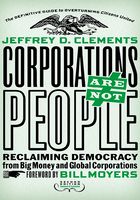
Corporate Rights Weaken People and Citizenship
Look again at how the Court of Appeals labeled what dairy farmer Dexter Randall and so many other Vermont people had done by deciding to participate in our government of the people. According to the court, by passing a right-to-know law, the people of Vermont committed a “wrong” to the constitutional rights of others, specifically, to the industry’s “constitutional right not to speak.”
This is how the fabrication of corporate rights hollows out American citizenship. A successful demand by a person or class of people for rights amounts to a declaration that such a person or class is equal to everyone else and has an equal share of sovereignty in our nation. Government then is accountable to that person, rather than the other way around. When we accept that people have constitutional rights, we quite properly have disdain for those who deprive our fellow people of rights, and we will resist. At a minimum, we are careful, or should be, not to press for government action that might hinder rights of others. After all, in a society of people with equal rights, when the government violates the rights of any of us, none of us is secure.
When courts strike down laws where they conflict with constitutional rights, they make a statement about who we are as a people and as a country. As we come to accept these judgments of the courts (or when we do not), our culture and politics, and even our way thinking and acting, can change. Brown v. Board of Education ruled that segregation violates the equality rights of African Americans; that helped transform who we are and how we act. Reed v. Reed ruled for the first time in 1971 that laws that discriminate against women are wrong; that contributed to a transformation of how we view gender in America. More recently, we are seeing the role of the courts in shaping how Americans perceive the freedom of all people to marry the person they love. Court cases about rights may reflect and accelerate, rather than cause, movements and change. Yet when the courts rule, an insistent proposition about American life begins to become a fact.
The same phenomenon tends to occur when courts declare that corporations hold the constitutional rights of people, as Dexter Randall found out. Lewis Powell’s advice to the US Chamber of Commerce in 1971 sought not merely to propose policies but to change American society. As Powell made clear, the creation of corporate rights is an “instrument for social, economic, and political change.”
These corporate rights cases, then, mean much more than allowing the Bad Frog Corporation to say whatever it wants on its beer labels, or the cigarette corporations to target children for addiction to a fatal product, or Monsanto to deprive people of information about food. All of that would be bad enough. The impact of these cases goes beyond their specific facts; they push people back from exercising vigilance about corporate power and from acting as citizens in a republic. Even mild proposals that might serve the public good, from environmental stewardship to disclosure and transparency in the financial system, now get buried under savage attacks from corporate interests. Those who might serve as potential public champions are accused not merely of being “wrong” but of violating constitutional principles. Public champions retreat into defensiveness and uncertainty. As with other major developments of previously unrecognized constitutional rights, the fabrication of corporate rights is changing American culture.
The new metaphor of corporations as people in our Bill of Rights threatens to erode, perhaps we can say “corporatize,” the American character. We can see this in many areas of American life, from the state of our media to declining civic participation and voting. What we thought of as public for generations, from the sublime, such as mountains or groundwater, to the utilitarian, such as prisons, is shifting away from us, and over to corporate control. Corporate power is shifting the law, our public assets, even how we think about ourselves and what we teach our children.